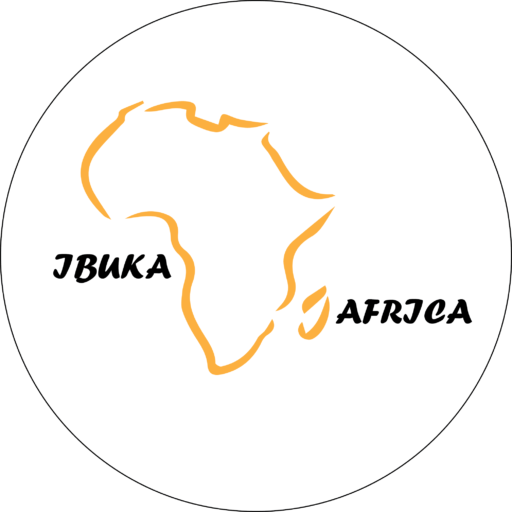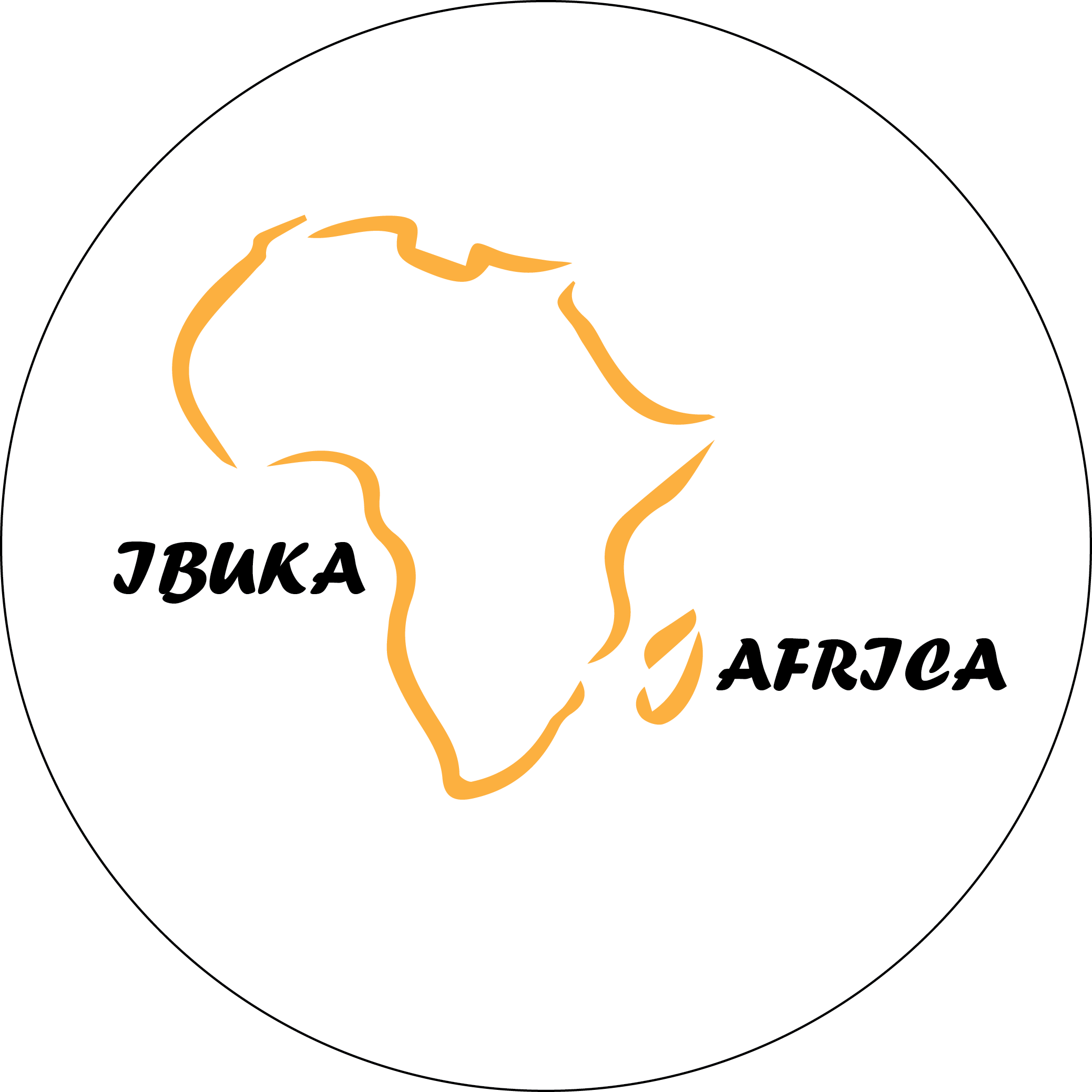One Man’s Dream to Bring Ultimate Tourism to Tanzania
This post was written by guest author Fortunat Mueller
Traveling through Tanzania last fall during our family’s year long sabbatical trip abroad, we couldn’t help but notice that soccer is everywhere.
On the slopes of Mount Kilimanjaro, our guides and porters huddled around their solar powered radios on the trail and at camp to listen and cheer for their team in the latest match between Simba and the Young Africans in the Tanzanian premier league. On a tour of a banana plantation in the rural village of Mto wa Mbu (mosquito river), we encountered a young boy on the trail kicking a ball of rags and inviting us to join his game. From the yard of our house on the outskirts of Arusha, we watched in awe as dozens of bulldozers and cranes from the Chinese National Railway Company began construction of what will eventually be a thirty thousand seat (!) stadium to host the Africa Cup of Nations finals in 2027. A truly bizarre thing — a shiny state of the art stadium being built at the end of dirt road in a settlement of a few dozen tin roof shacks. Whether it be for fitness, for entertainment, or for economic development, football has clearly captured the imagination of this young country.
If Elias Lucas, an entrepreneur, coach, and community organizer who we met in Arusha, has his way, the same will soon be true for ultimate frisbee.
Born and raised in the Olasiti district of Arusha, Elias is passionate about the benefits of arts and sports for young people. As a former competitive martial artist and gymnast, he understands the value of sport for kids goes well beyond the obvious physical fitness benefits. Participating in athletics and competition can help young people build resilience and mental toughness as well as problem solving and collaboration skills, which are transferable to the rest of their lives.
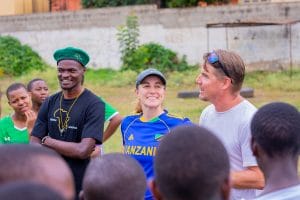
“I love the spirit of sports because sport brings people together regardless of their race, religions, nationality, gender,” said Elias. “[We can] bring students together in order to get to know each other and learn from each other, to teach about being a good person and positive in order to have better communities now and in the future. And of course, to help them to know the importance of training in order to stay healthy mentally and physically.”
When he was first introduced to ultimate while living abroad in Malawi in 2019, Elias immediately fell in love with the game and the concept of “Spirit of the Game,” and he understood its potential to engage youth and teach these critical life skills. When he returned to Arusha, Tanzania, he was surprised that the only ultimate he could find in this region of over 2.5 million people was the weekly pickup game at one of the city’s international schools, catering nearly exclusively to the city’s sizable ex-pat population.
To Elias, who had returned home to Arusha to put his tourism and wildlife degree to work by starting a Safari company, Ibuka Africa Travel, this seemed like a missed opportunity. Tanzania is both a young country and a country of youngsters. Established only in 1964 as the combination of East African sovereign states, Tanganyika and Zanzibar, Tanzania is a thriving and vibrant young nation that has a median age of just 17 among its population of 65 million. Based on his experience in Malawi and his own athletic background, Elias was determined to introduce the sport of ultimate frisbee to some of those 30 million boys and girls.
“I promote frisbee because my aim is to see the youth involved in sports. We want the students to be involved in sports so that they can grow in a good way. And they can avoid having bad behavior because I believe sport is the thing that can give you a chance to meet other good people. So that’s why I dedicated myself to teach the youth about sport, and especially frisbee.”
In 2022, Elias approached three secondary schools in the Arusha region and proposed to help them start an ultimate program. The reception he received was lukewarm, at best; none of the school administrators had ever heard of ultimate, and in any case they tended to be skeptical of sports or any extra-curricular activities. The Tanzanian government has put a lot of resources into building schools to meet the needs of their growing young population, but public education in Tanzania tends to be rather strict and didactic, with a focus on rote memorization and preparing for the critically important SFNA (Standard Four National Assessment) tests. Many school administrators see little room for sports or arts in their school, and even those who would otherwise support such activities don’t often have the resources to make them accessible to students, and almost never to girls.
“The hardest part I faced at the beginning of starting and introducing ultimate frisbee for the first time at schools is that I didn’t get a lot of support from teachers,” said Elias. “Many of them were not aware of [the] importance of sports to students. I had a hard time when I want to organize two schools to meet for friendly matches, as the teachers had so much excuses to not do that.”
But Elias is persistent and his enthusiasm is infectious. After lots of lobbying, he was able to convince the senior administrators at two local schools to allow him to recruit and train students, so long as he was able to cover any costs associated with the programs himself. Luckily, a basic ultimate program is pretty cheap and Elias used the modest profits from his young safari company to purchase a handful of discs, a few cones, and a set of red and yellow practice pinnies. The pinnies are proudly emblazoned with the name Ibuka Africa Travel and the slogan “My Talent, My Future,” which Elias has adopted as the mantra of his youth development efforts.
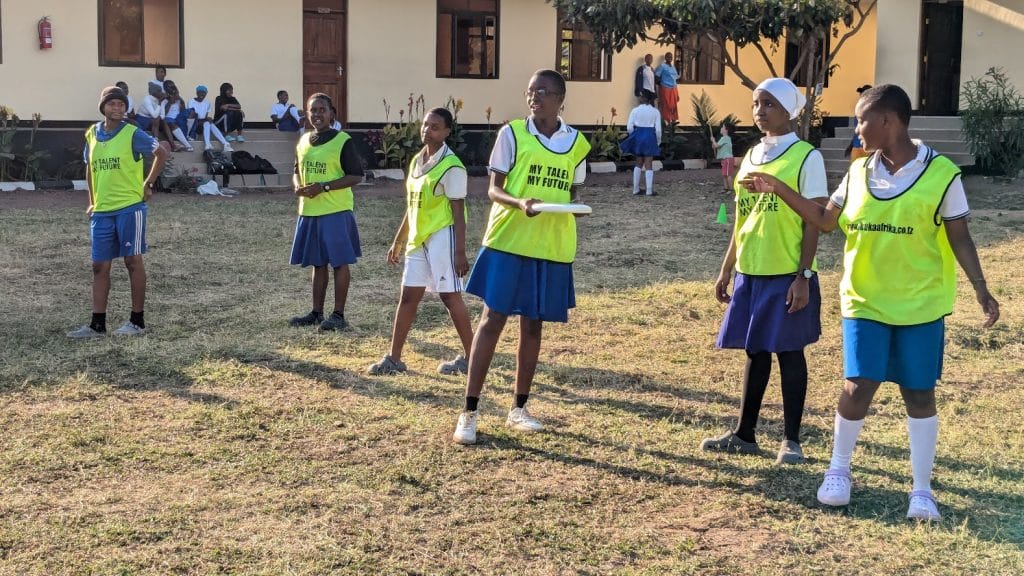
Elias recruited some students and started holding training a few times a week. One of the first schools to accept Elias’ proposal is the Patandi Maalum secondary school, a coed boarding school in Tengeru district of Arusha that caters specifically to students living with disabilities. The Patandi Maalum team is totally inclusive, and not only coed, but also includes a number of athletes who are hearing impaired, others who have physical disabilities that limit their mobility, and even one young athlete who plays in a wheelchair (and has a wicked forehand).
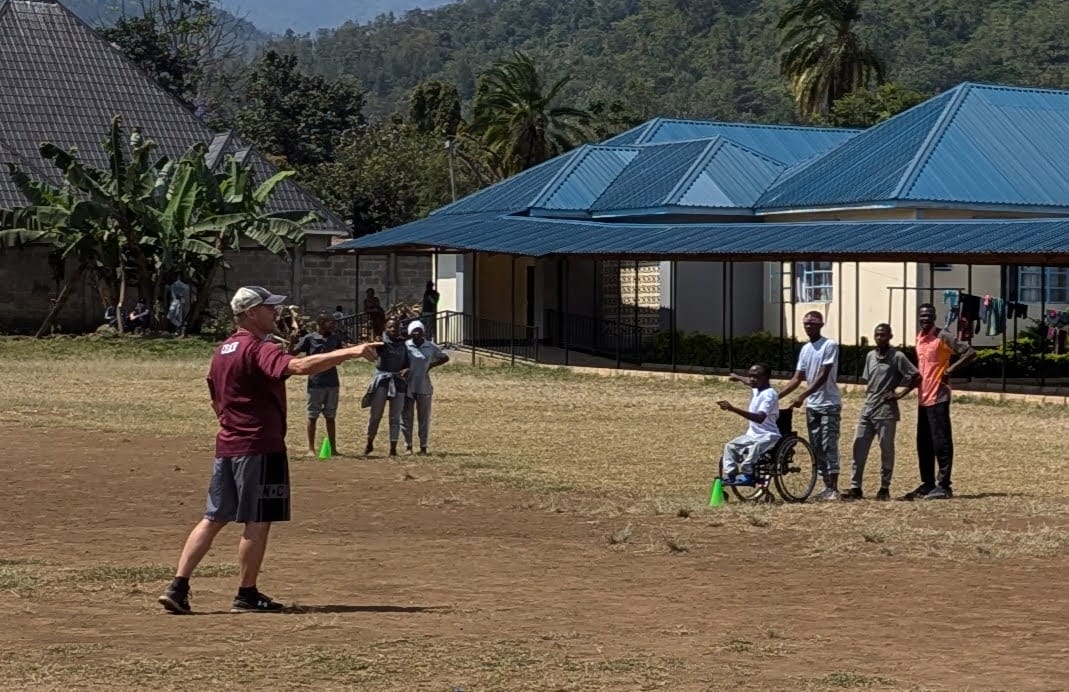
At Patandi Maalum, practices are held on the school’s dusty soccer pitch. Across town at the Arusha Girls High School in the Olasiti district, the school has no athletic fields at all, so ultimate practices are held in the small courtyard between the school’s tidy single story, yellow stucco academic and dormitory buildings. The courtyard, while grassy, is also littered with rocks the size of avocados, unexpected potholes and an occasional termite mound. Cleats are a rarity on any of the teams and some students play barefoot, while others wear sneakers or even Crocs.
When asked how they can run so fast and cut so hard, a student from Arusha Secondary school answered, “We run like motorcycle,” referring to the famous pikipiki motorcycle taxis which weave wildly, but deftly in and out of stopped traffic in front of Arusha’s Kilombera market, all while loaded with all manner of cargo including goats, bananas, 10-ft. sticks of pipe, and even mattresses or whole families on a single bike. Asked whether he’s really going to play barefoot on this rough field, the student proudly answered, “Yes, my legs [feet] is my shoes.” And so they are.
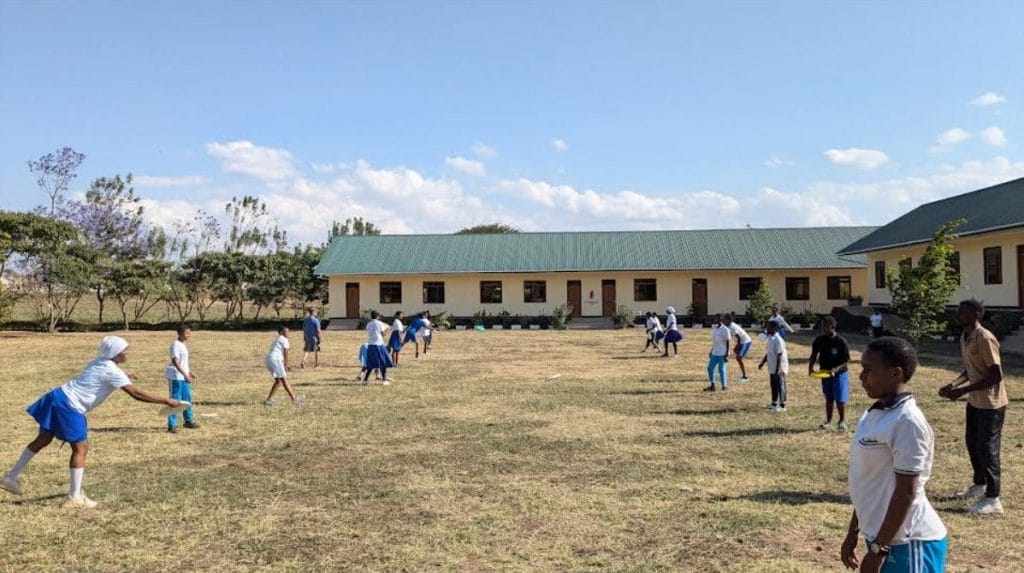
Few of the students have dedicated sports attire, instead often training in their school uniforms: blue knit skirts and white blouses at AGHS, red skirts and sweaters for the girls at Arusha Day school; and button-up shirt, tie and red sweater for the boys at Arusha Secondary across the road. The small handful of frisbees Elias brings from school to school in his backpack are a mix of different molds from manufacturers around the world and show signs of their hard use, in some cases held together only with scraps of duct tape. But neither a little duct tape on the frisbee, nor poor fields and footwear can contain the impact that sports, and ultimate in particular, has on students.
Anita Aristides is 16 years old, a form 5 student, and one of the first girls to join the ultimate team at Arusha Secondary school. A smart, athletic and competitive young woman, she’s eager to practice her English with a foreign visitor. She credited ultimate with helping develop her confidence and leadership, and raising the ambition she has for herself. “Frisbee is not only a game, but frisbee is a game which can change people’s lives in leadership, communication, even teamwork in society,” she said. “For example, me, I was a person who is not charming to others, not outgoing somehow, but frisbee, when I learned to play frisbee, it changed my life, my attitude, even my passion to do something.”
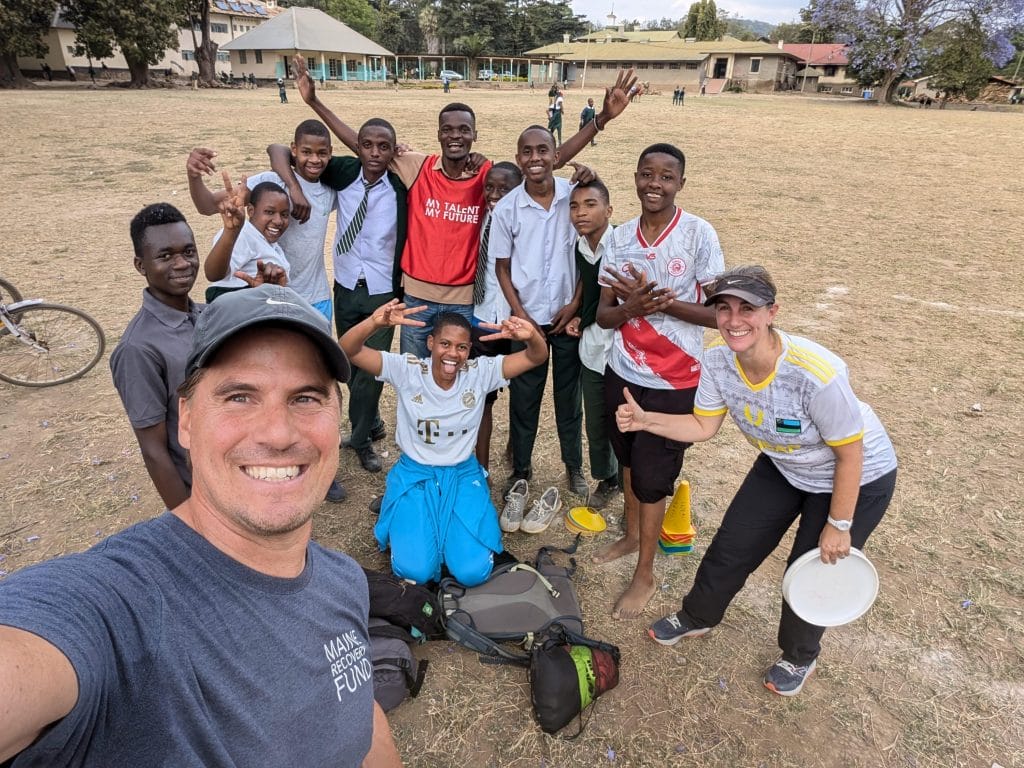
All of us who have been athletes or coaches understand the power of this kind of personal transformation through sport. It can be a tremendous gift to any student or young person, but here in Arusha this kind of impact may be even more important for Tanzanian girls. According to the UNFPA, one in four girls in Tanzania aged 15-19 is pregnant or has already given birth, and most of those girls will go on to drop out of school and be trapped in the cycle of generational poverty.
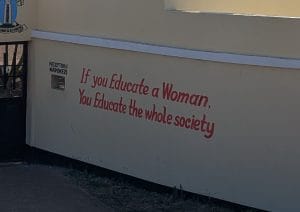
Understanding this, Tanzania’s first female president, Dr Salia Suluhu Hassan, has made improving public education a priority of her government, especially for girls. On the pink walls surrounding the Arusha Girls High School, a mural declares: “If you educate a Woman, you educate the whole society,” while inside the courtyard of the nearby Arusha Day school, a small wooden sign nailed to a yellow acacia tree drives home the same message in somewhat starker terms: ‘‘Education today, pregnancy later.” Perhaps someday there will be another sign in the courtyard that reads, “play ultimate, stay in school.”
Only two years after beginning the Arusha youth ultimate program with just two (reluctant) schools, Elias has converted some of the skeptics in the schools into champions. Meshack Philipo from Sorenyi Secondary School relates ultimate is, “Increasingly providing comfort to our students, they are increasingly gaining greater connections, but they are also increasingly strengthening themselves, both physically and mentally.” Thanks to these early successes, a number of the schools that previously turned Elias down now allow him to recruit students and start a team.
And then, in the spring of 2024, a lucky connection helped to spark an expansion of Elias’ ambition for the future of his business and his community work, and a vision for their possible intersection.
Ivan Xu is a world traveler, ultimate player and youth ultimate coach in Shanghai, China. He’s also an enthusiastic ultimate frisbee evangelist (10 years ago in his twenties he biked through Europe…). In early 2024, Ivan was in Tanzania preparing to climb Mt. Kilimanjaro with Elias and Ibuka Africa Travel. While waiting for an appropriate weather window, Ivan spent a week with Elias as a guest coach with a number of the local teams. He was blown away.
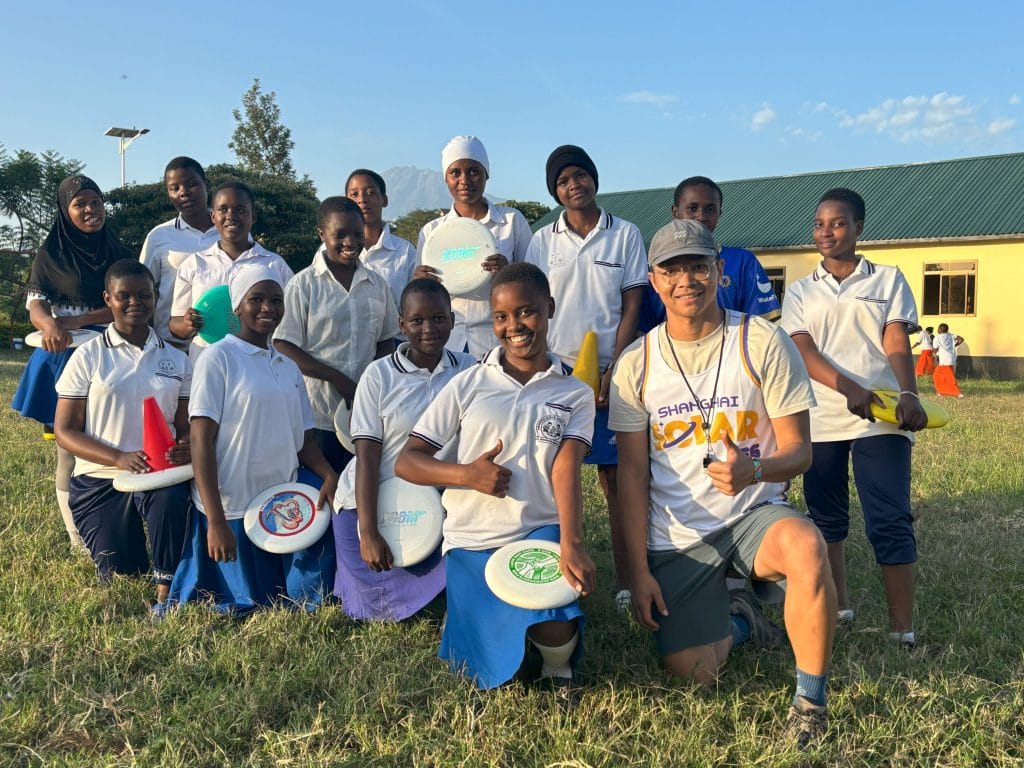
“One month ago, I never thought I would come to teach frisbee in Africa, but it turned out to be the most meaningful thing I’ve done this year,” said Ivan. “When I found out that April and May are the rainy season for Kilimanjaro and it is not recommended to climb during this time, I thought, ‘What could I do to make myself useful?’ As I researched on internet, I found Elias…and I decided to help him.”
In the week before their Kilimanjaro ascent, Ivan and Elias visited four schools and held six clinics for local youths. Ivan was impressed: “Kids here have a strong drive to make a catch. Some could even catch better than the youth players I coached for three years in Shanghai,” he said. “There might be 40 kids in a school that like frisbee, but there is only one frisbee at the school. For a chance to catch the disc a kid may need to wait five minutes. So if you don’t make the most of your chance to catch, the next chance is five minutes later.”
Ivan procured and donated 20 frisbees to the local teams and created a YouTube video about his experience:
Elias was delighted to have the coaching help and the additional frisbees for his players. But as he observed his young players interacting with Ivan on and off the field, Elias also had another insight: his guest and his students were both benefiting tremendously from the opportunity to get to know one another. His students were not only getting expert coaching from an experienced high level player, but were simultaneously practicing their English and being exposed to people and cultures from abroad, thereby expanding their perspective, ambitions and creating long term connections. In a rapidly developing country like Tanzania, where both tourism and foreign investment and opportunity are growing every year, it’s hard to overstate the value of that experience and perspective.
In the meantime, his guest was also benefiting tremendously, experiencing an authentic, mutually beneficial connection with the community he was visiting. “I think of the friendships I built over the days; the people who treated me like their brothers. I think I will come back. I don’t want this to be a one time deal,” said Ivan. “I hope the frisbee program here can be sustainable. I hope that through playing ultimate, the lifestyle of the kids can become healthier, they can develop friendships, and new doors may open for them because of the sport.”
These kind of genuine, non-extractive and mutually beneficial connection with local people and culture is hard to achieve in travel, and is at the heart of the growing trends towards what is known as “cultural tourism” or “responsible tourism.”
As one of Africa’s leading tourist destinations, Tanzania receives over a million tourists annually. They come to Tanzania to experience the breathtaking wildlife in the Serengeti, to challenge themselves on the majestic peak of Mt. Kilimanjaro (Africa’s highest mountain and the tallest free-standing mountain in the world), or to relax on the pristine white sand beaches of Zanzibar. According to the World Tourism and Travel Council, foreign tourism contributes over 20 trillion TZS to the local economy (7.72 billion USD), representing nearly 10% of GDP.
An ever-increasing number of those tourists strive for a more meaningful experience that includes connecting to the people and the cultures in an authentic way. As a country created from over 130 different tribes with distinct traditions, languages, history and culture, Tanzania is an ideal place for this kind of deeper tourist engagement. Many safari tours or Kilimanjaro climbs now also include optional visits to a traditional Maasai Boma (homestead), or a tour of a traditional coffee farm of the Chagga tribe, or a visit to the famous wood carving shops of the Makonde or blacksmith shops of the Iraqw.
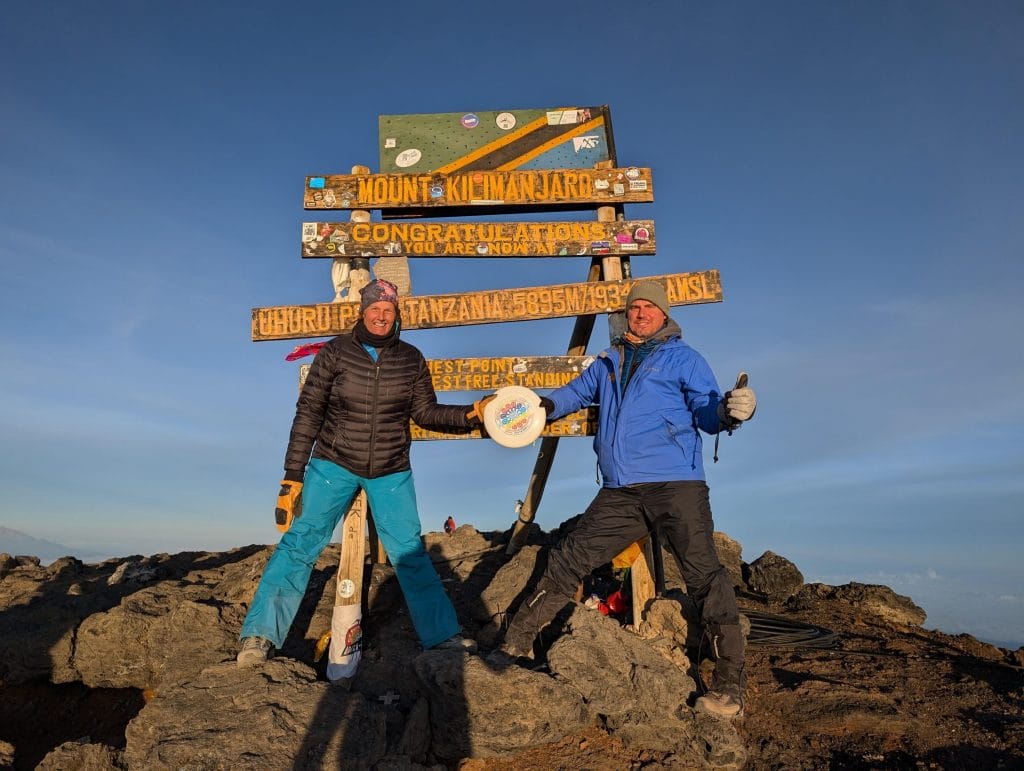
These cultural tourism experiences can be fascinating and an improvement from the historically extractive tourism practices of previous generations, but by their nature they can still lead to interactions that are somewhat contrived and artificial, and necessarily primarily commercial/transactional. Ibuka offers all of these experiences to its international clients, but with inspiration from Ivan’s experience, Elias imagines going a step further and really connecting travelers to local Tanzanians in an authentic, mutually beneficial way. And he wants to start with the world’s ultimate players.
Though still early in concept, Elias is working to develop Tanzania experiences that could include any of the core Tanzanian tourist experiences (safari, mountain trek, beach excursions) and the traditional cultural tourism pieces, but in addition include the opportunity to connect travelers and locals in a modern context through sports and arts. Rather than using just a portion of his profits to fund youth enrichment, Elias imagines a deeply integrated experience, giving travelers a more holistic and authentic view and connection to life in Tanzania today, while providing local youth with athletic opportunities, leadership training, and valuable life experience, including international relationship and connection.
Early last year, when our family first started to plan our trip to Tanzania, I went in search of a local pickup ultimate game. This is something I’ve done in nearly every city I’ve visited or lived in since I started playing ultimate more than 30 years ago (gulp), as in my experience, there’s no better way to quickly meet some interesting people in a new city than finding an ultimate game to join. My internet research on ultimate in Tanzania was not very promising. While the WFDF homepage shows the Tanzania Flying Disc Federation (TFDF) is the national governing body, it is impossible to find any other information about them and it’s not clear they still exist. The last post in the Tanzania Ultimate Frisbee Facebook page was an unanswered “Where can I find a pickup game in Arusha?” question from 2021. And while South Africa and even nearby Kenya and Uganda have a number of rec leagues, club teams and tournaments, I couldn’t find evidence of anything similar in Tanzania.
When we arrived in Arusha, I learned there is actually a weekly pickup game on St. Constantine’s International School’s campus catering mostly to the ex-pats who work in the tourism industry or at the UN, the African Court of Human Rights, or the many other African and international NGOs that are based in Arusha. On the day I first attended, there was also a group of young local students participating, laughing, shouting and running barefoot circles around the cleated, mostly older, pickup crowd. Their energy and joy was infectious. After the sun set and we were done playing, I was introduced to Anita Aristides, who explained the students were at pickup because their school was on break and so the teams weren’t practicing. I was surprised and impressed to learn about local high school ultimate and delighted when Anita invited me to join a practice, where she introduced me to Elias.
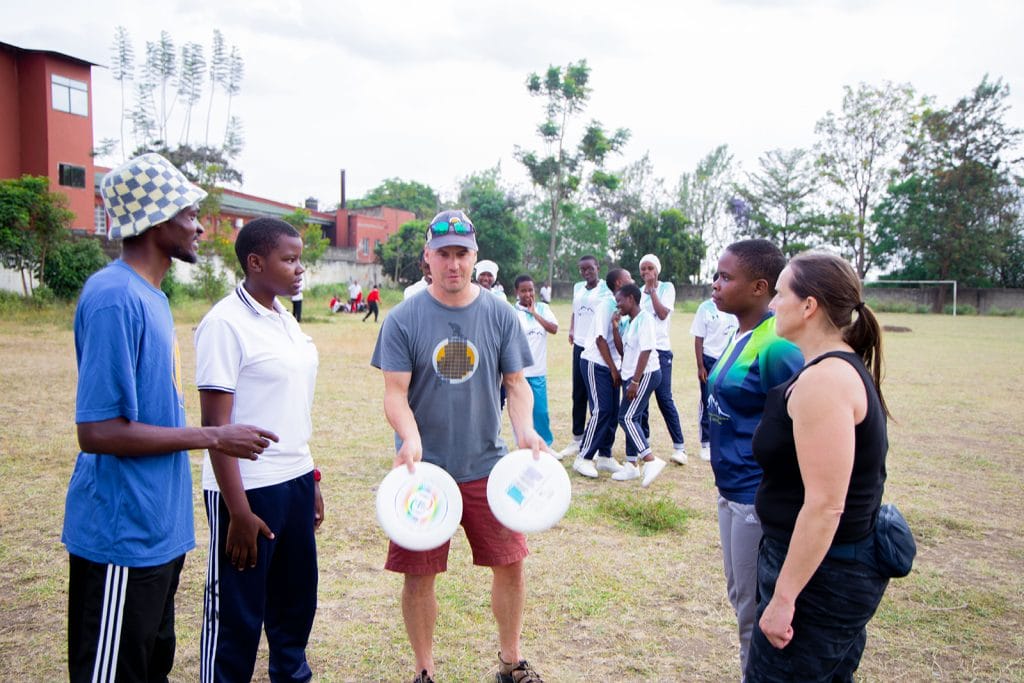
Over the coming months, my wife Shana and I, as well as a number of our American frisbee playing visitors, had the opportunity to guest coach a number of the local high school teams together with Elias. From his initial two schools, Elias has grown the nascent local high school ultimate community in Arusha to eight teams and over 120 players. In early December of last year, he invited us to participate in a weekend tournament, which four of his teams attended. Because limited transportation and cost makes inter-school matches difficult, this tournament was the very first opportunity for most of the players to compete in a real match against another team.
In anticipation of the tournament, Elias and Ibuka provided each team with a set of matching, brand new competition athletic jerseys, so when they arrived at Arusha Day school on the day of the tournament, they really looked the part. The school athletic field was surrounded by curious students and faculty and the PA system blasted Afrobeats music, while the smell of freshly fried samosas and pani puris filled the air. Under the bright equatorial sun, the teams battled hard, learned about the joys and difficulties of self officiation, and celebrated one another.
At the end of play, a local official was on hand to present the championship trophy to the players of Patandi Maalum’s team, and the Spirit of the Game Trophy to the all-girls team from the Arusha Day School, who despite ultimately losing all their games, brought grit, persistence and joy to each and every point.
Arusha Secondary School players dancing in celebration of their spirit of the game award. Video: Fortunat Mueller
Shana and I actually met playing ultimate and have both had the joy of playing, coaching and being a part of the ultimate community for three decades. In that time, we’ve had the opportunity to play all over the world, made lots of great friends and had amazing experiences, but I can honestly say our experience in Arusha was among the highlights of our time in Tanzania and our ultimate careers. A number of American frisbee friends of ours, who visited us in Arusha en route to safari or other adventures, also joined to guest coach for an afternoon and had similar experiences.
And Elias is just getting started. He recently connected with the ultimate coaches of two of the region’s many international schools. Reflecting the typical divide between local and expat communities in much of Africa, those international schools primarily compete against one another in athletics. Elias is hoping to change that, and plans to invite the international school teams to the next tournament he organizes for the local teams. Just as he’s experienced with international guest coaches, he is certain those opportunities for connection and relationship building will have lasting benefits for everybody involved.
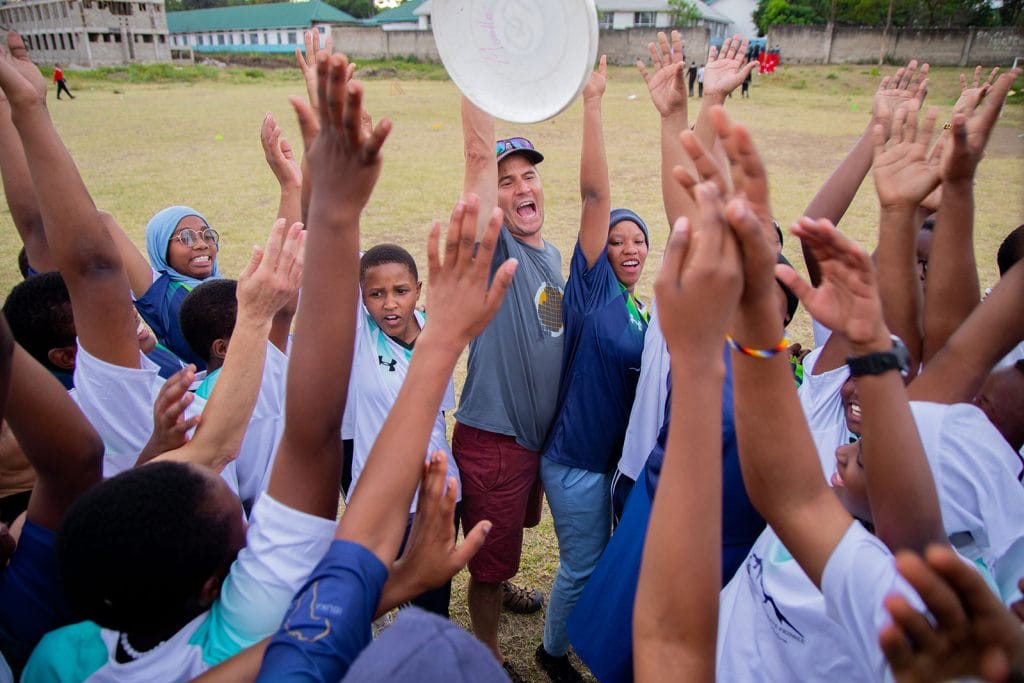
Elias says Ibuka Africa Tours’ mission is, “To connect travelers with the vibrant essence of Tanzania. We believe that travel should be transformative—an opportunity to engage with local cultures, immerse oneself in breathtaking landscapes, and encounter the remarkable wildlife that makes Tanzania a world-renowned destination.”
Based on my experience, I think Elias may really be on to something.
Are you an ultimate player considering a trip to Tanzania or East Africa? Consider connecting with Elias through his travel company’s website, Ibuka Africa, or emailing for more information at info@ibukaafrica.com
